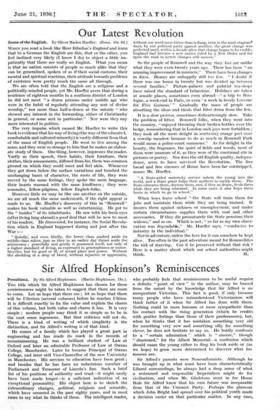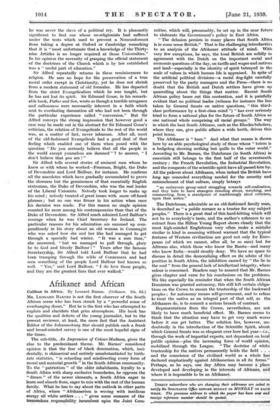Sir Alfred Hopkinson's Reminiscences
Penultima. By Sir Alfred Hopkinson.... (Martin Hopkinson. 18s.). THE title which Sir Alfred Hopkinson has chosen for these reminiscences might be taken to suggest that there are more to come. Let us hope that there are ; let us hope that, there will be Ulteriora (several volumes) before he reaches Ultinza. It is difficult exactly to fix the value and explain the charm of this volume, but both value and charm it has. It is very simple ; modern people may think it so simple as to be in the cant sense ingenuous. But that criticism will not do. There is a kind of writing of which simplicity is the distinction, and Sir Alfred's writing is of that kind.
He comes of a family which has played a great part in engineering and has made its mark in the records of mountaineering. He was a brilliant student of Law at Oxford and later an admirable Professor of. Law at Owens College, Manchester. Later he became Principal of Owens College, and later still Vice-Chancellor of the new University in Manchester. His services to education have been great ; and besides that he has been an industrious member of Parliament and Treasurer of Lincoln's Inn. Such a brief list of his positions of authority and trust—it might easily have been made longer=is a sufficient indication of an exceptional :imrsonality. His object here is to sketch the extraordiintry - changes, political, religiOus and scientific, which have occurred in the past eighty years, and in most cases to say what he thinks of them. The intelligent reader,
who probably feels that reminiscences to be useful require a definite " point of view " in the author, may be braced from the outset by the knowledge that Sir Alfred is an unrepentant Victorian. This fact is good, if only, because many people who have misunderstood Victorianism will think better of it when Sir Alfred has done with them. Nothing could be more humane or more sympathetic than his contact with the rising generation (which he credits with gentler feelings than those of their predecessors), but, when he thinks that it haS mistaken_ something . very old for something very new and something silly for something clever, he does not hesitate to say so. He boldly confesses a " certain admiration " which is " sincere," though "chastened," for the Albert Memorial—a confession which should cause the young either to fling his book aside, or (as we hope) to grow more determined to discover what his reasons are.
.- Sir Alfred's parents were Nonconformists. Although he was brought up in what must have been characteristically Liberal surroundings, he always had a deep sense of what a restrained and responsible Imperialism might do for civilisation, and when Mr. Gladstone went in for Home Rule Sir Alfred knew that his own future was inseparable from that of the Unionist Party. Perhaps the glamour which John Bright had spread over his political youth made a decision easier on that particular matter. In any case,
he was never the slave of a political cry. It is pleasantly significant to find one whose co-religionists had suffered under the tests which used to prevent a Nonconformist from taking a degree at Oxford or Cambridge remarking that it is " most unfortunate that a knowledge of the Thirty- nine Articles is no longer required at those Universities." In his opinion the necessity of grasping the official statement of the doctrines of the Church which is by law established was a " useful part of education."
Sir Alfred repeatedly returns in these reminiscences to religion. He sees no hope for the preservation of a true moral order except in Christianity, yet he does not shrink from a modern statement of old formulas. He has departed from the strict Evangelicalism which he was taught, but he has not lost its spirit. Sir Edmund Gosse, in his remark- able book, Father and Son, wrote as though a terrible arrogance and callousness were necessarily inherent in a faith which sent to everlasting damnation all who had not been through the particular experience called " conversion." But Sir Alfred conveys the strong impression that however good a case may be made out in the abstract for Sir Edmund Gosse's criticism, the relation of Evangelicals to the rest of the world was, as a matter of fact, never inhuman After all, most of the old-fashioned Evangelicals had a good deal of that feeling which enabled one of them when posed with the question " Do you seriously believe that all the people in the world except yourselves are damned " ? to answer, " I don't believe that you are ! "
Sir Alfred tells several stories of eminent men whom he knew or with whom he worked—Freeman, Bright, the Duke of Devonshire and Lord Balfour, for instance. He confirms all the anecdotes which have gradually accumulated to proVe the slowness but the genuineness of that essentially English statesman, the Duke of Devonshire, who was the real leader of the Liberal Unionists. Nobody took longer to make up his mind ; nobody treated of great issues with more off-hand phrases ; but no one was firmer in his action when once his decision was made. For this reason no single opinion counted for more among his contemporaries than that of the Duke of Devonshire. Sir Alfred much admired Lord Balfour's courage when he was Chief Secretary for Ireland. The particular reasons for his admiration are summed up com- pendiously in his story about an old woman in Connaught who was asked how she and her like had managed to get through a specially bad winter. " It was a sore time," she answered, " but we managed to pull through, glory be to God and bloody Balfour " Years after the famous Secretaryship, Sir Alfred told Lord Balfour that he had been tramping through the wilds of Connemara and had seen something of the people Lord Balfour had known so well. " Yes," said Lord Balfour, " I do love those people, and they are the greatest liars that ever walked."









































 Previous page
Previous page